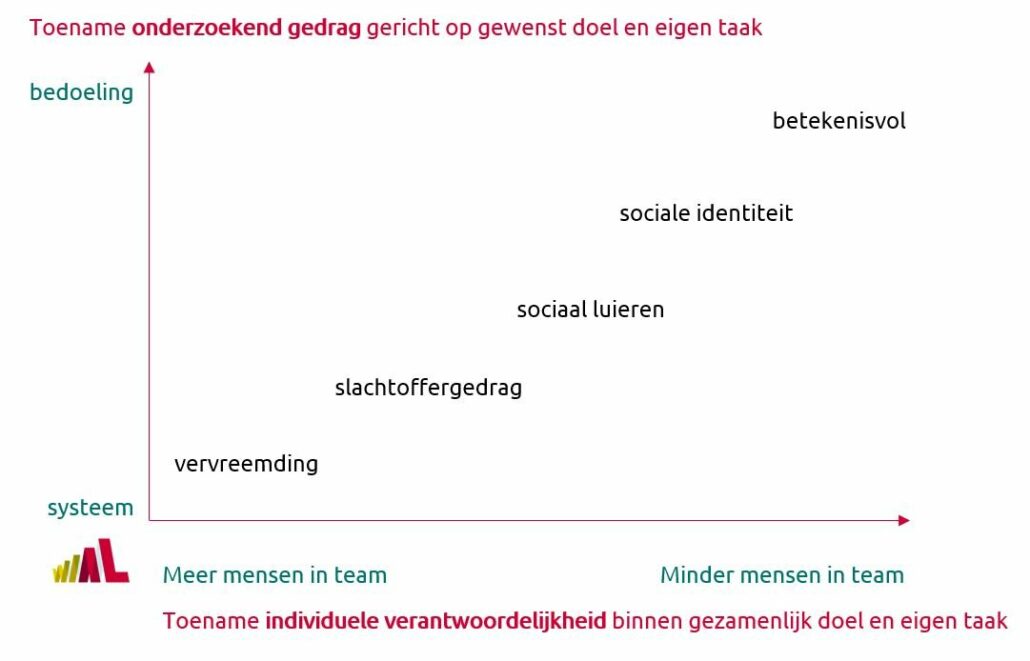Invent it yourself, take ownership! A common cry of despair in organizations. But what makes it that this just doesn't seem to work in business?

And privately it succeeds!
Daily practice shows that we humans set all kinds of goals as soon as it is meaningful to us. Whether it's our vacation, wedding or training your son or daughter's soccer team, we go for it! We don't need an external incentive for this. It's mine! We have a goal, we determine what we want to invest time and money, set ourselves a deadline and find people who can help us. We solve problems along the way and we learn as we go. In other words, we humans can absolutely take ownership and enjoy it too!
So where does business go wrong?
People often cannot identify what the mission and vision of the organization is, don't know what the departmental objective is, how it translates to our team objective and how my own personal contribution adds to it. This problem becomes more pronounced as organizations with many layers of management and departments increasingly cut the work into areas of responsibility and standardize it into small routine tasks.
Wouter Hart describes in his book 'Verdraaide organisaties' that the counterpart of intention is the system world. This stands for the frenetic manageability of coordination mechanisms, control systems and management methods, with the result that people no longer see what their work contributes to the greater whole and to why they started doing this work in the first place: intention.
Undercurrent
The word organization already says that you don't do it alone. You are dealing with a group of people. A group of people with different interests and backgrounds. The feeling and thought about something or someone, we call the undercurrent. People, like animals, are afraid of no longer belonging. If a monkey falls outside the group it does not survive in nature. So I don't want to be different, not to be alone in an opinion. I keep my mouth shut. This makes why things go wrong even more complex.
The effect is alienation
There are studies that show that far too large a group of working people think that their work does not matter at all. They feel they cannot influence developments and decisions. No longer understand the arguments of choices. The result: it is no longer mine! It is someone else's problem (read: ownership). I am now talking about them! This is the stage that I am alienated from the organization.
Influence of the leader
Various studies show that as the number of people in a team grows, people feel less and less responsible for their personal contribution to achieving the group goal and thus the team's right to exist. As a result, you usually need more people to do the same amount of work! The influence you have as a team leader and department manager is to take a good look at what your optimal group size is to accomplish a certain amount of work and keep in mind that too many people in a team leads to a lower contribution per person and less self-esteem and satisfaction per individual team member (see the x-axis in the figure).

In contrast, the y-axis shows the impact that the more controllability you organize, the further away you get from ownership. To feel ownership, something must have meaning for me and I must have influence over choices that realize the desired effect. Besides the fact that more control often means more investment in the organization around the actual work, you also tend to need more people to do the work!
You are also influential in working with team members to peel off the team goal to the individual contribution, and together you can set ground rules of cooperation within the team.
The core is in the freedom and ability of people to ask through, hold each other accountable for the agreed behavior, learn in the action and reflect with each other and determine together what and how to adjust. So this is different from the solution process as applied with scrum teams etc.
Team Performance Process Supervisor
By creating the environment that best contributes to the desired effect you seek and supports people in developing the necessary skills, you are most likely to have people's behavior automatically adapt accordingly.
WIAL helps you with the Team Performance Process facilitator training (action learning coach) to facilitate the preconditions of team ownership.
Read more about the first step Certified Action Learning Coach training program
Note: Figure in this blog is not scientifically based, though the various components have emerged from research. I have put them together in a figure and serves as inspiration for thinking about the impact of intention versus system and the greatness of teams on the well-being of team members.
World Institute for Action Learning - Netherlands, Frank Campman MBA PALC, November 2020.
